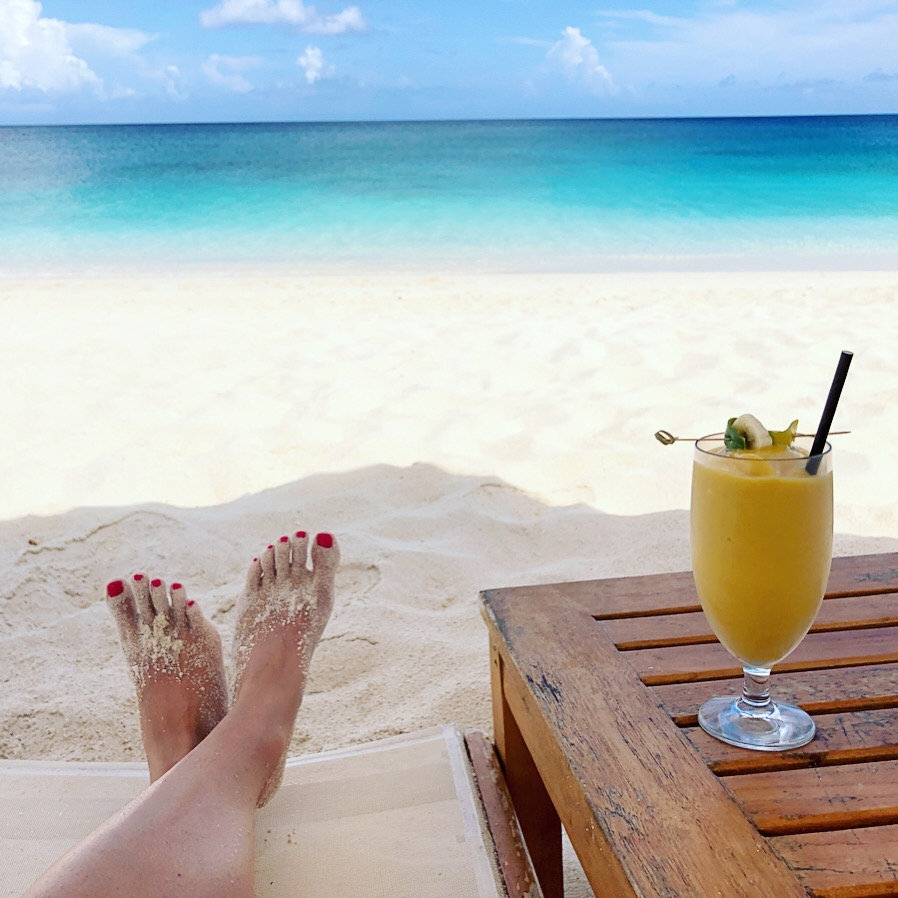
Nearly 70% Work on Vacation: 7 Ways to Detach
Nearly 70 of people work on vacation 7 ways to detach – Nearly 70% of people work on vacation: a startling statistic that reflects the modern reality of work-life integration. While the allure of a relaxing getaway remains, the constant pull of work seems to follow us even on our time off.
But it doesn’t have to be this way. In this post, we’ll explore the reasons behind this phenomenon, delve into the potential benefits and drawbacks of working on vacation, and most importantly, provide practical strategies for achieving a true mental and emotional disconnect.
From setting clear boundaries to utilizing technology strategically, we’ll uncover a range of approaches that can help you reclaim your vacation time and truly enjoy the experience. Whether you’re a remote worker, a business owner, or simply someone who struggles to switch off, these tips can guide you towards a more fulfilling and rejuvenating vacation experience.
The Impact of Working on Vacation

The decision to work on vacation is a complex one, often driven by a desire to stay on top of deadlines or maintain a sense of control. However, the implications of this choice extend beyond mere productivity and can significantly impact your overall well-being and vacation experience.
While some may find benefits in working on vacation, the potential drawbacks are substantial and warrant careful consideration.
Potential Benefits of Working on Vacation
The allure of working on vacation stems from the perceived benefits it offers. For some, it may provide a sense of accomplishment, a way to stay connected, or even a means to escape the monotony of a typical workday.
- Increased Productivity:Some individuals find that working in a new environment, away from the usual distractions of the office, can boost their productivity. The change of scenery and a break from routine can foster focus and creativity. For example, a writer may find inspiration in a quiet café by the beach, or a designer might discover innovative ideas while exploring a bustling city.
- Flexibility:Working on vacation can offer a sense of flexibility, allowing individuals to manage their time and tasks according to their own schedule. This can be particularly beneficial for those with demanding jobs or unpredictable schedules. For instance, a freelance writer might take advantage of a few hours in the morning to work before enjoying the rest of the day exploring a new city.
- Reduced Stress:For some, working on vacation can serve as a distraction from the stresses of daily life. The ability to catch up on work or address urgent tasks can alleviate anxiety and provide a sense of control. This can be particularly helpful for individuals who struggle with work-life balance or experience high levels of stress.
Potential Drawbacks of Working on Vacation
While working on vacation may seem appealing, it can have significant drawbacks that can undermine the intended benefits.
- Burnout:Constantly working, even on vacation, can lead to burnout. The lack of a clear separation between work and leisure can blur the lines and make it difficult to fully disconnect. This can result in fatigue, exhaustion, and a diminished sense of well-being.
It’s a common misconception that vacations are solely for relaxation, but the reality is that nearly 70% of people still work while on vacation! If you’re struggling to truly disconnect, maybe it’s time to assess your financial health – where do you stand financially get a score on this quiz and our advice.
A solid financial foundation can provide the peace of mind to truly embrace your vacation and leave work behind. After all, a relaxed mind is the key to a truly restorative getaway!
A study published in the Journal of Occupational Health Psychology found that individuals who worked during their vacation were more likely to experience burnout symptoms than those who took a complete break.
- Decreased Enjoyment:Working on vacation can detract from the enjoyment of the experience. It can limit opportunities for relaxation, exploration, and meaningful connections with loved ones. For example, a family vacation may be marred by constant emails and phone calls, hindering the ability to fully engage in shared experiences and create lasting memories.
- Strained Relationships:Working on vacation can strain relationships with family and friends. It can send the message that work is a priority over spending quality time with loved ones. This can lead to resentment, misunderstandings, and a sense of disconnect. A recent survey by the American Psychological Association found that individuals who worked during their vacation reported lower levels of relationship satisfaction than those who took a complete break.
Comparison of Experiences
The experiences of individuals who work on vacation versus those who take a complete break can vary significantly.
- Individuals who work on vacationoften report feeling a sense of accomplishment and control, but they may also experience burnout, decreased enjoyment, and strained relationships. Their vacation may be less relaxing and rejuvenating, and they may return to work feeling depleted rather than refreshed.
- Individuals who take a complete breakoften report feeling more relaxed, refreshed, and engaged upon their return. They are able to fully immerse themselves in their vacation experiences, create lasting memories, and return to work with renewed energy and focus. Studies have shown that taking a complete break from work can improve productivity, creativity, and overall well-being.
Strategies for Detachment

Taking a vacation should be a time for relaxation, rejuvenation, and creating lasting memories. However, for many, the constant pull of work can make it difficult to truly disconnect. This can lead to a stressful vacation, diminished enjoyment, and even impact your well-being.
Here are effective strategies to help you detach from work and embrace the freedom of your time off.
Setting Clear Boundaries
Setting clear boundaries is essential for successfully detaching from work during vacation. This involves establishing clear expectations about your availability and defining what constitutes an emergency.
- Inform your colleagues and clients:Clearly communicate your vacation dates and let everyone know that you will have limited access to email and phone. Consider setting up an automated email response that informs people of your unavailability and provides alternative contact information for urgent matters.
- Establish a “work-free zone”:Designate specific areas or times as “work-free” zones. This could be your hotel room, the beach, or even certain hours of the day. By creating these boundaries, you signal to yourself and others that these spaces are dedicated to relaxation and personal time.
- Disable work notifications:Turn off email and app notifications on your phone and computer. The constant pinging of notifications can be a major distraction and can quickly pull you back into work mode. This can be a challenging step for some, but it can be incredibly effective in creating a sense of detachment.
Managing Expectations
Managing expectations, both your own and those of others, is crucial for a successful vacation. It’s about setting realistic goals for your time off and understanding that it’s okay to prioritize your well-being.
- Prioritize personal time:Focus on activities that bring you joy and relaxation. This could be spending time with loved ones, exploring new destinations, or simply indulging in a good book. Avoid filling your schedule with too many activities or commitments, leaving room for spontaneity and flexibility.
- Embrace the “do nothing” mentality:Don’t feel pressured to constantly be productive or busy. Embrace the freedom of doing nothing and allow yourself to relax and recharge. This can be a challenging concept for many, but it’s essential for truly detaching from work and experiencing the benefits of a vacation.
- Communicate your boundaries:Be clear with colleagues and clients about your availability and what you are willing to handle while on vacation. This helps set realistic expectations and prevents unnecessary stress. For example, you could state that you will only check emails once a day or that you are unavailable for phone calls unless it’s an emergency.
Prioritizing Personal Time
Prioritizing personal time during vacation is about making conscious choices that support your well-being and allow you to fully engage in the experience. It’s about saying “no” to distractions and embracing the freedom to choose how you spend your time.
- Schedule downtime:Dedicate specific time slots in your vacation schedule for activities that promote relaxation and rejuvenation. This could include reading, taking a nap, going for a walk, or simply spending time in nature.
- Limit screen time:Excessive screen time can be detrimental to your mental and physical well-being. Make an effort to limit your screen time during vacation, focusing instead on engaging in activities that involve real-world experiences.
- Disconnect from work-related activities:Avoid checking work emails, responding to messages, or engaging in any work-related activities during your vacation. This allows you to fully disconnect from work and truly immerse yourself in your personal time.
Utilizing Technology Strategically
Technology can be a double-edged sword when it comes to detaching from work. While it can be a source of distraction, it can also be a tool to help you stay connected and manage your workload effectively.
It’s crazy to think that nearly 70% of people work on vacation, but with the rise of remote work and the always-connected world, it’s harder than ever to truly detach. One way to find some peace and quiet might be to explore the potential of blockchain technology in areas like supply chain management or digital identity, as explored in this insightful article areas where bitcoin blockchain technology is applicable.
Maybe a little time spent learning about the potential of blockchain could help you truly unplug from the everyday grind and give your mind a much-needed break.
- Use technology to automate tasks:Utilize tools and apps that automate tasks, such as email filters or scheduling software, to reduce the amount of manual work you need to do while on vacation. This can free up your time and allow you to focus on enjoying your time off.
- Set up out-of-office replies:Create a clear and concise out-of-office reply that informs people of your unavailability and provides alternative contact information for urgent matters. This helps manage expectations and prevents unnecessary emails and calls.
- Use a separate device:Consider using a separate device, such as a tablet or e-reader, for personal activities while on vacation. This can help you avoid the temptation to check work emails or messages on your primary device.
Creating a “Work-Free” Environment
Creating a “work-free” environment is about establishing physical and mental spaces that promote relaxation and detachment from work. This involves minimizing distractions and creating a sense of separation between work and personal time.
- Pack lightly:Avoid bringing unnecessary work materials or devices that could tempt you to check emails or engage in work-related activities. This helps create a sense of separation and encourages you to focus on relaxation and personal time.
- Leave work at the office:If possible, physically leave your work materials at the office or at home. This helps create a clear mental separation between work and vacation. This can be a challenging step for some, but it can be incredibly effective in creating a sense of detachment.
- Choose a vacation destination that supports your goals:Select a vacation destination that aligns with your goals for detachment and relaxation. Consider a location that offers limited internet access or a quiet environment that promotes relaxation and introspection.
Practicing Mindfulness and Self-Care, Nearly 70 of people work on vacation 7 ways to detach
Mindfulness and self-care are essential components of detaching from work and promoting well-being. By practicing mindfulness techniques and engaging in activities that support your mental and physical health, you can create a sense of calm and balance.
- Engage in activities that promote relaxation:This could include yoga, meditation, deep breathing exercises, or spending time in nature. These activities can help you de-stress, clear your mind, and create a sense of calm and balance.
- Practice mindfulness:Pay attention to your thoughts and feelings without judgment. This can help you become more aware of your stress levels and identify triggers that pull you back into work mode. By being present in the moment, you can better enjoy your vacation and disconnect from work-related worries.
It’s tough to truly unplug when nearly 70% of people work on vacation, but finding ways to detach is crucial for mental well-being. It’s a stark contrast to the high-stakes political landscape, where tensions are rising as the pentagon plans for a possible Pelosi trip to Taiwan.
Amidst such global events, it’s even more important to prioritize our own mental health and find those peaceful moments of disconnect, even if it’s just for a few minutes each day.
- Prioritize sleep:Adequate sleep is essential for mental and physical well-being. Make sure to get enough sleep during your vacation, as this can help you feel refreshed and more able to fully detach from work. Consider establishing a regular sleep schedule and creating a relaxing bedtime routine.
Seeking Support
It’s important to remember that you don’t have to detach from work alone. Seek support from friends, family, or a therapist if you’re struggling to disconnect. They can provide encouragement, accountability, and helpful strategies for managing stress and prioritizing your well-being.
- Talk to a therapist or counselor:A therapist can provide guidance and support in developing healthy coping mechanisms for managing work-related stress and detaching from work during vacation. They can also help you identify and address any underlying issues that may be contributing to your difficulty in disconnecting.
- Connect with friends and family:Spending time with loved ones can be a great way to distract yourself from work and focus on personal connections. Share your goals for detachment and ask for their support in helping you stick to your boundaries.
- Join a support group:There are many online and in-person support groups for people who are struggling with work-life balance and detaching from work. These groups can provide a safe and supportive environment to share experiences, learn from others, and develop strategies for managing stress and prioritizing well-being.
Technology’s Role in Detachment
The modern world is intricately woven with technology, making it a powerful tool for both facilitating work and achieving detachment during vacation. While technology can enable remote work and enhance travel experiences, it also presents challenges that can blur the lines between work and leisure.
Technology’s Dual Role in Work and Detachment
Technology has become an indispensable part of modern life, offering both opportunities and challenges when it comes to achieving detachment during vacation. On the one hand, technology empowers remote work, allowing individuals to stay connected and productive even while traveling.
This flexibility can be advantageous for professionals who need to remain accessible or manage urgent tasks. On the other hand, the constant availability of work-related tools can lead to a blurring of boundaries between work and leisure, making it difficult to truly disconnect from professional responsibilities.
Potential Pitfalls of Relying on Technology for Work While on Vacation
The accessibility of technology during vacation can lead to several pitfalls that hinder relaxation and rejuvenation. One significant issue is the temptation to check work emails and messages constantly, leading to a sense of being “on call” even while on vacation.
This constant connectivity can contribute to stress and anxiety, diminishing the intended benefits of a break. Additionally, working during vacation can disrupt the flow of leisure activities and create a sense of guilt for not fully engaging in the vacation experience.
Utilizing Technology to Enhance Vacation Experiences
While technology can present challenges, it can also be a powerful tool for enhancing vacation experiences while minimizing work distractions. Setting clear boundaries and establishing specific times for checking work emails and messages can help maintain a balance between work and leisure.
Utilizing technology to research destinations, book activities, and navigate unfamiliar areas can enhance the overall vacation experience.
The Importance of Rest and Recharge

Vacation is meant to be a time for relaxation and rejuvenation, a chance to step away from the daily grind and recharge our batteries. However, for many, the temptation to check emails, respond to messages, or even tackle work projects lingers.
This constant connection can significantly hinder our ability to truly rest and reap the benefits of a break.
The psychological and physiological benefits of taking a complete break from work during vacation are undeniable. Our brains need time to decompress and process information, and our bodies need time to recover from the stress of work. When we fail to disconnect, we risk burnout, anxiety, and decreased productivity.
Benefits of Rest and Recharge
The benefits of taking a true vacation extend beyond simply feeling refreshed. A complete break from work can lead to improved creativity, problem-solving skills, and overall well-being.
- Enhanced Creativity:When we are rested and relaxed, our minds are free to wander and make new connections. This can lead to breakthroughs in problem-solving and the development of new ideas. A study published in the Journal of Applied Psychology found that employees who took vacations were more likely to come up with creative solutions to work problems.
- Improved Problem-Solving Skills:A rested mind is a sharp mind. When we are not constantly bombarded with work-related stress, we are better able to focus and analyze information. This can lead to improved decision-making and problem-solving abilities.
- Reduced Stress and Anxiety:Work-related stress can take a toll on our mental and physical health. Taking a break from work allows us to reduce stress levels and improve our overall well-being.
- Improved Sleep:A good night’s sleep is essential for both our physical and mental health. When we are rested, we are more likely to sleep soundly and wake up feeling refreshed.
- Increased Productivity:Contrary to what some may believe, taking a vacation can actually lead to increased productivity. When we return to work feeling refreshed and rejuvenated, we are more likely to be focused and engaged.
Tips for Maximizing Rest and Relaxation
Taking a true vacation requires intentionality. Here are some practical tips for maximizing rest and relaxation during vacation time:
- Set Boundaries:Before you leave, inform your colleagues and clients that you will be unavailable for work. This will help to manage expectations and ensure that you are not constantly bombarded with requests.
- Turn Off Notifications:Silence your phone notifications and resist the urge to check email or social media. Give yourself permission to truly disconnect from work.
- Engage in Activities You Enjoy:Vacation is a time to do things you love. Spend time with loved ones, pursue hobbies, or explore new places.
- Practice Mindfulness:Mindfulness techniques, such as meditation or yoga, can help to reduce stress and promote relaxation.
- Get Enough Sleep:Make sure to get enough sleep each night. This will help you to feel rested and rejuvenated.
- Eat Healthy Foods:Eating healthy foods will give you the energy you need to enjoy your vacation. Avoid processed foods and sugary drinks.
- Stay Hydrated:Drink plenty of water throughout the day. Dehydration can lead to fatigue and headaches.
The Future of Vacation and Work: Nearly 70 Of People Work On Vacation 7 Ways To Detach
The line between work and vacation is blurring, leading to a future where these concepts are redefined and integrated in new ways. We’re moving towards a more flexible and integrated approach to work and leisure, with a focus on personal well-being and productivity.
Flexible Work Arrangements
The rise of remote work and flexible schedules is a significant factor in the evolution of vacation and work. Individuals have more control over their work hours and location, blurring the lines between traditional workdays and vacation time. This flexibility allows individuals to work from anywhere, including vacation destinations, potentially extending their vacations or incorporating work into their travel plans.
- Remote work:Remote work enables individuals to work from any location with an internet connection, allowing them to work while on vacation or extend their vacation time by working remotely. This flexibility allows individuals to prioritize their work and leisure preferences.
- Flexible schedules:Flexible schedules, such as compressed workweeks or flexible hours, offer individuals greater control over their time, allowing them to adjust their work schedules to accommodate vacation time or travel plans.
Digital Detox Initiatives
The constant connectivity of the modern world can be overwhelming, especially during vacations. Digital detox initiatives encourage individuals to disconnect from technology and focus on rest and relaxation. This trend promotes a more mindful approach to vacation time, prioritizing personal well-being and disconnecting from work-related distractions.
- Mindful vacationing:Digital detox initiatives encourage individuals to disconnect from technology and reconnect with themselves and their surroundings, promoting a more mindful and restorative vacation experience.
- Improved well-being:Disconnecting from technology can reduce stress, improve sleep quality, and enhance mental and emotional well-being, leading to a more fulfilling and restorative vacation.
Redefined Vacation Experiences
The future of vacation is evolving beyond traditional beach holidays or city breaks. Individuals are seeking more immersive and meaningful experiences that combine work, leisure, and personal growth. This trend emphasizes the importance of personalized travel, blending work and leisure activities, and fostering a sense of purpose and fulfillment during vacation time.
- Experiential travel:Individuals are seeking travel experiences that offer unique and enriching opportunities, such as volunteering, learning new skills, or exploring local cultures, creating a more meaningful and memorable vacation.
- Workation:Workation, a combination of work and vacation, allows individuals to work remotely while exploring a new location, blending work and leisure activities and creating a more dynamic and engaging travel experience.
Last Recap
Ultimately, achieving a successful detachment from work during vacation is a personal journey. It requires self-awareness, intentional effort, and a commitment to prioritizing your well-being. By embracing the strategies discussed, you can reclaim your vacation time, return to work refreshed and re-energized, and foster a healthier relationship with work in the long run.






